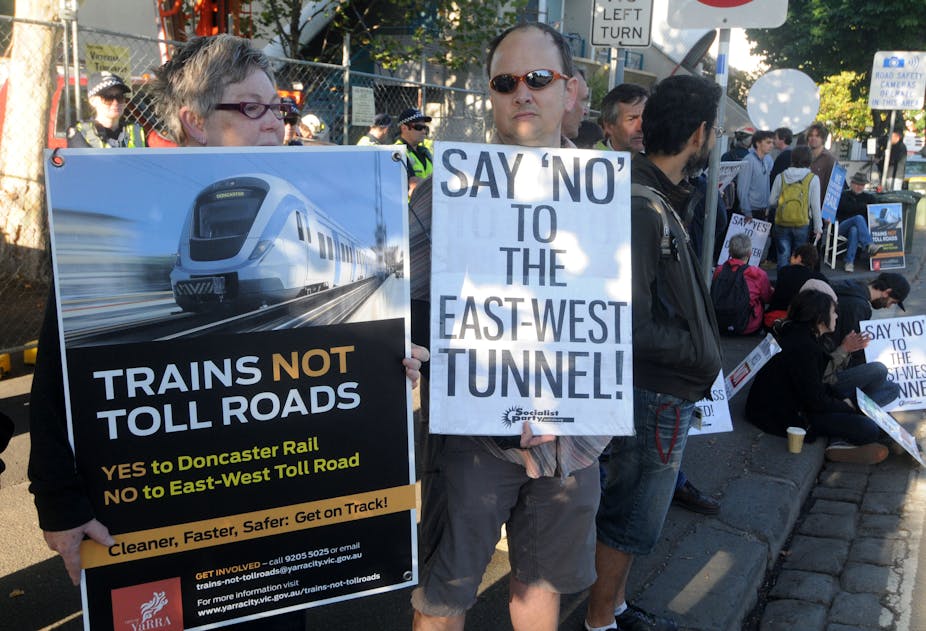Australia does not have a national cities policy. But in committing funding to transport infrastructure, the federal government is significantly shaping Australian cities. Local government and community-based groups are left vying to have their say from within local communities.
Who is dictating urban policy?
New South Wales and Victoria each released metropolitan strategies in 2013. Both strategies contained big-ticket transport infrastructure projects.
Currently, however, federal government policy is shaping Australian cities over and above these metropolitan strategies. As the player with the deepest pockets, the Commonwealth has immense sway over urban policy.
The urban policy and planning priorities set out by the previous federal government have changed considerably with the dissolution of the Major Cities Unit. The unit was responsible for coordinated capital city planning and infrastructure advice across governments.
The election in 2013 of a new federal government, committed to funding road infrastructure over urban rail, helped elevate state-level commitments to build the East West Link in Melbourne and WestConnex in Sydney above large urban rail projects.
Community groups and local government are campaigning against these road projects. These campaigns have exposed a disconnect between a federal government that holds most of the power over the public purse, the states that bear responsibility for infrastructure delivery and metropolitan planning, and the public’s expectation that they will have a say on transport decisions.

Not just another NIMBY campaign
Understanding the significance of transport investments, not least the use of public funds to finance one piece of infrastructure above another, community-based groups have been spurred into action.
In Victoria, the debate between proponents of the 4.5 kilometre cross-city East West freeway tunnel and community groups urging greater investment in public transport starkly illustrates the divide between government investment in infrastructure and local expectations of urban policy.
Community groups and other active citizens are mounting a strong case in hearings before the panel advising the Victorian government on the East West Link. These proceedings are providing a prominent platform for debate on city-defining transport projects.
Beyond the walls of the hearing, though, community groups are also seeking to influence the debate on metropolitan transport.
Many campaigns have wielded the power of social media to air concerns and disseminate information. Other groups have organised public meetings and panel discussions to share expertise and guide thinking on alternative transport options.
Policy has electoral consequences
Victorians are engaging with transport issues and connecting the dots to urban policy. This is evident in savvy policy-focused campaigns, community-based gatherings to express solidarity and the proliferation of solution-seeking debates in social media.
Such efforts are creating dynamic spaces for groups to challenge a project shrouded by political rhetoric and evasion. Most importantly, community efforts are widening the debate over Victoria’s transport possibilities.
Set on shaping the urban policy debate, some recently formed community-based groups, alongside other long-standing advocates for public transport, have created platforms for Victorians to engage politically with decisions on the state’s direction.
The former Brumby Labor government’s public transport policy failure is widely regarded as a decisive factor in its defeat in 2010. Community campaigns could indeed influence the Victorian election in November.
There may also be implications at the national level. Policies on cities, productivity and infrastructure are expected to feature in the next federal election.
Public demands a say
While the federal government holds money for big infrastructure and states set the urban policy agenda, community groups are finding ways to interject. In Victoria, this includes the recent creation of the Future Melbourne Network.
It is increasingly hard to deny citizens involvement in the urban and transport governance of Australian cities. For months, dozens of community groups have fervently organised their offensives.
As the East West Link panel hearing enters its sixth week and community groups and individuals present their case, they aim to reclaim a place for the public in discussions that determine urban policy and transport priorities.
Many Victorians have taken up the cause to change the course of transport decision-making. Some are more compelled than ever to have a dialogue on projects that will shape the future of the city. Will state and federal leaders tune in to the public conversation?

